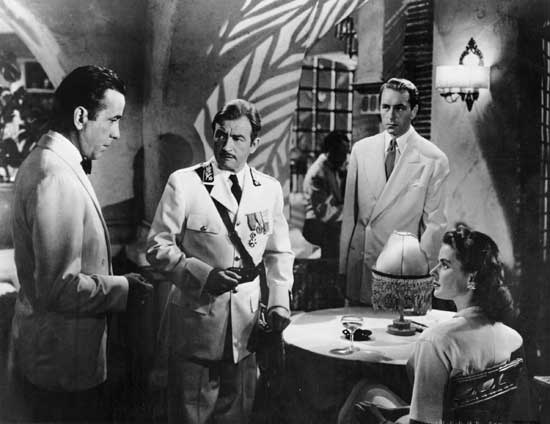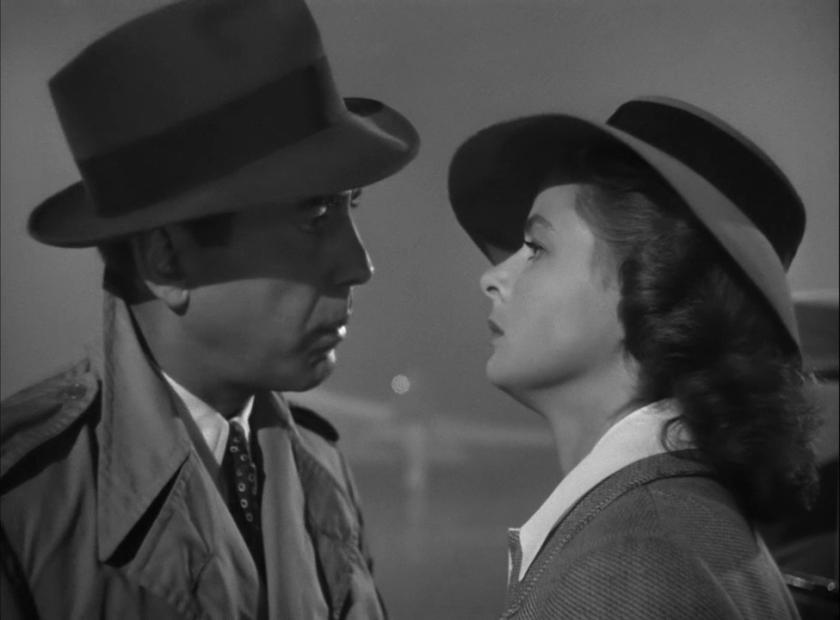You must remember this. It’s December 1941, the month of Pearl Harbour. Richard Blaine (Humphrey Bogart), an American, probably a Communist, who fought Franco in Spain and ran guns to Ethiopia when Mussolini invaded, has given up the fight against fascism and become the proprietor of Rick’s Café Américain, a casino-nightclub in Casablanca, in unoccupied French Morocco. A mecca for refugees from Europe seeking transit papers that will enable them to fly to neutral Lisbon and thence sail for America, the café is a hotbed of shady deals to which Rick, cynical and aloof, turns a blind eye.
He also passively (if sardonically) accepts the rule of Vichy, personified by the local prefect of police, Louis Renault (Claude Rains). Charming but corrupt, Renault buys sexual favours from young women needing visas. For the benefit of the Nazi Major Strasser (Conrad Veidt), Renault stages at Rick’s the arrest of the con man Ugarte (Peter Lorre), who had killed two German couriers to get his hands on the transit papers they were carrying.
 Like a Foreign Legionnaire, Rick, accompanied by his confidant and piano player Sam (Dooley Wilson), have come to North Africa to forget a woman. Ilsa Lund deserted him at the height of their heady love affair when the Germans occupied Paris, as a famously giddy flashback explains. His equilibrium crumbles when Ilsa walks into Rick’s with her husband, the Czechoslovakian freedom fighter Victor Laszlo (Paul Henreid, standing at right, with Bogart, Rains, and Bergman), desperate to trace the transit papers, which Ugarte coincidentally entrusted to Rick. Will Rick rekindle his romance with Ilsa and use the transit papers to flee with her, or will he forego his love for her and redeem himself by allowing Laszlo and Ilsa to leave, enabling Laszlo to continue his work as an inspirational resistance leader? The question is, of course, rhetorical.
Like a Foreign Legionnaire, Rick, accompanied by his confidant and piano player Sam (Dooley Wilson), have come to North Africa to forget a woman. Ilsa Lund deserted him at the height of their heady love affair when the Germans occupied Paris, as a famously giddy flashback explains. His equilibrium crumbles when Ilsa walks into Rick’s with her husband, the Czechoslovakian freedom fighter Victor Laszlo (Paul Henreid, standing at right, with Bogart, Rains, and Bergman), desperate to trace the transit papers, which Ugarte coincidentally entrusted to Rick. Will Rick rekindle his romance with Ilsa and use the transit papers to flee with her, or will he forego his love for her and redeem himself by allowing Laszlo and Ilsa to leave, enabling Laszlo to continue his work as an inspirational resistance leader? The question is, of course, rhetorical.
But knowing the story doesn’t impair one’s wonder at the undiminished magic of Casablanca in its 70th year. It isn’t flawless. Some of the humour is tepid. Henreid is wooden and makes Laszlo unbearably smug. And the revelation that Ilsa didn’t know Laszlo was still alive when she started her affair with Rick makes her seem less intriguing than Bergman’s sexier, more dissolute Alicia Huberman in Hitchcock’s 1946 Notorious. (Not that the censor Joseph Breen would have allowed Ilsa to commit adultery wilfully).
Renault's virtual admission of love for Rick supplies the film with a startling gay subtext
The film has so many riches undimmed by age, however. The exotic atmosphere suggests the influence of Josef von Sternberg’s Dietrich pictures. It expertly blends melodrama and film noir into a thrilling hybrid for which the director, Michael Curtiz, must take some credit even though Hal B Wallis, Warner Bros’ head of production, was the guiding spirit. Then there is the magnificent supporting cast: above all, Rains, oozing bonhomie as Renault, whose virtual admission of love for Rick and final departure into “a beautiful friendship” with him supplies the film with a startling gay subtext; Lorre, sweaty and cringing as Ugarte, whom Rick despises less than he admits; and Sydney Greenstreet, airily Machiavellian as Ferrari, Casablanca’s top wheeler-dealer, who unexpectedly shows a decent side when, unpaid, he tells Lazslo and Ilsa something they need to know. Ferrari affects a benevolent wave that he may have picked up from worldly locals, a lovely touch.
Along with these superb character actors and others such as SZ Sakall (Carl, Rick’s fond maitre d’) and John Qualen (Berger, the Norwegian resistance man), Wallis peopled the film with European refugees who gave the film texture and emotional authenticity. Among them were the Jewish performer Marcel Dalio, from Renoir’s La Grande Illusion and La Règle du Jeu, who played the croupier Emil, and his wife Madeleine LeBeau, who played the French barfly Yvonne who resents Rick for not prolonging their affair and like a Vichy collaboratrice takes up with a Nazi officer, only to weep tears of Gallic pride when Laszlo leads Rick’s clientele in their spine-tingling rendition of “La Marseillaise”. (Dalio and LeBeau had left Paris ahead of the occupation and had departed Lisbon with forged visas that stranded them briefly in Mexico; they broke up during the filming of Casablanca).
 Ultimately there is Bogart’s Rick, the cryptic American “isolationist” whose return to the anti-Nazi cause at the end was calculated, in this official propaganda film, to galvanise the American public in late 1942: in case there was any doubt who was endorsing the need for America to fight in Europe and North Africa, Casablanca is Spanish for "White House". (The 26 November premiere came 16 days after the Allies took Casablanca, the kind of publicity boost Warners couldn’t have dreamed up.) Rick was Bogart’s first big romantic lead and his Oscar-nominated performance made him a major star. His definitive portrait of a bitter, abrasive man who is a romantic at heart, it is the centrepiece of his legend, the side panels being his Sam Spade in The Maltese Falcon and his Dix Steele in In a Lonely Place, for The Big Sleep, in which he played Philip Marlowe, is a screwball comedy masquerading as a noir.
Ultimately there is Bogart’s Rick, the cryptic American “isolationist” whose return to the anti-Nazi cause at the end was calculated, in this official propaganda film, to galvanise the American public in late 1942: in case there was any doubt who was endorsing the need for America to fight in Europe and North Africa, Casablanca is Spanish for "White House". (The 26 November premiere came 16 days after the Allies took Casablanca, the kind of publicity boost Warners couldn’t have dreamed up.) Rick was Bogart’s first big romantic lead and his Oscar-nominated performance made him a major star. His definitive portrait of a bitter, abrasive man who is a romantic at heart, it is the centrepiece of his legend, the side panels being his Sam Spade in The Maltese Falcon and his Dix Steele in In a Lonely Place, for The Big Sleep, in which he played Philip Marlowe, is a screwball comedy masquerading as a noir.
Bogart's portrait of a bitter, abrasive man who is a romantic at heart is the centerpiece of his legend
For most of the film Rick (pictured above with Lorre as Ugarte) doesn't act, but waits, watches, and wallows in self-pity. Only when Laszlo pricks his conscience two-thirds of the way through does there appear any sign that Rick will do the right thing with the letters of transit. Laszlo, who has been arrested by gendarmes at the cafe, looks back at Rick, who has ironically announced that “destiny has taken a hand”. Arthur Edeson's camera gently dollies in and Rick takes a drag on his cigarette. Then, ever so slightly, he juts out his lower lip, registering, as it turns out, a fresh resolve. His decision to sacrifice his love for Ilsa, having found her again, still seems impossibly noble, but then Casablanca is a Hollywood dream, a testament to illusionism and studio artifice. Bryan Ferry expressed the moral beauty of Rick's change of heart in “2HB”, an elegiac song about Bogart and Casablanca on Roxy Music’s first album: “Words don’t express my meaning/ Notes could not spell out the score/ But finding, not keeping’s the lesson.”
Watch a clip from Casablanca















Add comment